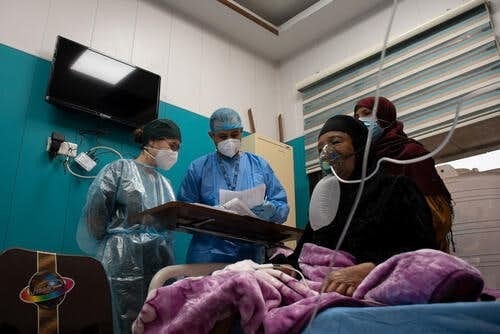
Iraq, severe COVID-19 patients in Baghdad hospitals only when 'almost certain to die'
COVID-19 in Iraq, MSF’s response. A year ago COVID-19 began to hit the world. Starting perhaps in China, it spread to northern Italy and then to every corner of the globe.
At the end of July 2020 in Baghdad, the capital of Iraq, something strange started happening.
In hospitals across the city, the doctors and nurses sweating in the Iraqi summer heat noticed that while their COVID-19 intensive care units were ever full, the wards for people with less severe cases were emptying out.
“The hospitals had been over-capacity in Baghdad and people were scared, so they were resorting to home care,” explains Omar Ebeid, project coordinator in Baghdad for Médecins Sans Frontières (MSF).
“People stopped going to hospitals. They came only when it was so late that they were almost sure to die.”
The hospitals in Baghdad are used to seeing sudden influxes of injured people, from the bombings that have followed the US invasion and the following long years of conflict.
As COVID-19 began to spread through the city’s streets last summer, however, weaknesses in the overstretched health system quickly became apparent.
Iraq, MSF opens dedicated COVID-19 ward
MSF teams were providing support in the respiratory care unit of Al-Kindi hospital throughout June, July and August.
They saw first-hand the increasing needs and how the hospital was unable to cope with the flood of COVID-19 patients that needed close and consistent follow-up.
“It was understandable that we saw many staff scared of COVID-19 and hesitant to work,” says Gwenola Francois, MSF Head of Mission in Iraq.
“What was more difficult was that the senior doctors were frequently absent from the hospital, and junior doctors were often unwilling to make vital decisions without them.”
MSF therefore agreed with the health authorities to add our own COVID-19 treatment ward inside Al-Kindi hospital, which opened in September with 24 beds, and later expanded to 36 beds in a purpose-built facility.
In the unit, doctors, nurses and other staff circulate in masks and blue gowns, taking vital signs, adjusting settings on ventilators, and explaining to family members what the situation of the sick person is and what treatments they are being given.
“We previously saw that sometimes caretakers could be violent towards healthcare workers when a family member died,” explains Ebeid, the project coordinator.
“We tried to avoid such violent reactions by increasing our communication with the families, and luckily we have not had any issues with violent caretakers on our ward.”
COVID-19 in Iraq: high numbers of patients arriving in critical condition
This level of communication is especially important in a unit that has treated many very sick people, with the death toll reflecting the seriousness of the cases received: there were 168 people admitted between September 2020 and February 7, and 86 of those died.
“Medically, the situation here has been very difficult,” says Dr Aurelie Godard, MSF’s intensive care adviser who worked in Al-Kindi in September and October.
“As patients have been hesitant to come to hospital, they are arriving very late, with very low oxygen levels and lots of complications.”
“When we started, the mortality rate for critical patients was almost 100 per cent, and although we’ve brought it down, it’s still very high,” Dr Godard continues.
“But working with our Iraqi colleagues we quickly developed new ways of working together and started to be able to discharge some patients that previously would have died.”
“In the first days of my work I was a little bit hesitant,” remembers Mahmoud Faraj, a nurse from near Mosul who is working with MSF in Baghdad.
“I was thinking about driving for five or six hours to work with people with the coronavirus, while other people were fleeing from this new dangerous disease.”
“But when I eventually worked with the patients and saw how people’s conditions change and how happy they become when they improve, I felt that I’m providing a great service,” says Faraj.
Read Also:
Coronavirus Healthcare Response In Conflict Zones – ICRC In Iraq
Mali, MSF Ambulance Blocked With Violence: The Patient Dies


